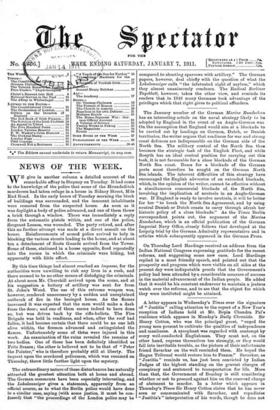The January number of the German Marine Rundschau has an
interesting article on the naval strategy likely to be adopted by England in the event of an Anglo-German wan On the assumption that England would aira at a blockade to be carried out by landings on German, Dutch, or Danish territories, the writer argues that readiness for war and strong coast defences are indispensable on the German side of the North Sea. The military control of the North Sea thus becomes the strategic task of the English Fleet, and while Rosyth has an ideal central position for carrying out this task, it is not favourable for a close blockade of the German North Sea coast. Bases for a blockade of the German ports must therefore be sought on the German North Sea islands. The inherent difficulties of this strategy have encouraged the English advocates of an extended blockade, which, in the opinion of the writer, cannot be effective without a simultaneous commercial blockade of. the North Sea, involving the implication of neutrals in an Anglo-German war. If England is ready to involve neutrals, it will be better for her "to break the North Sea Agreement, and by using neutral Danish or Dutch coasts to carry through afresh her historic policy of a close blockade." As the Times Berlin correspondent points out, the argument of the Marine Buncischau, which is an official publication of the German Imperial Navy Office, closely follows that developed at the Leipzig trial by the German Admiralty representative and in articles which subsequently appeared in the German Press.


















































 Previous page
Previous page